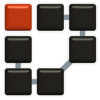Seminar: Communication Systems (WS 2022/23)

Details
| Type of course | Seminar (2 SWS) |
| ECTS credits | 2.5 or 5 |
| Language | German and English |
| Seminar | Thursday, 12:15 am – 2:00 pm, room 04.137 campo |
Network Calculus (NC) [1, 2] is a framework which allows to analyze the worst-case performance of communication networks, such as maximum message latencies or maximum buffer fillings. It has originally been invented for the Internet (e.g., for reservations as in Integrated Services) but has in the meantime been used for many other systems as well. It is relevant for any communication system with safety requirements, which typically need quality-of-service guarantees. There is an established international workshop series on that subject and NC is also used in industry. The Computer Networks and Communication Systems Lab (i7) is conducting a number of research projects based on NC, including vehicular and train communications, industrial communications and smart grids.
In this seminar we will first provide the basics of NC and then do an interactive training to get familiar with the methodology. Afterwards, participants have enough knowledge to read original papers and give talks on a recent research topic in that field. The seminar language will be English, basic knowledge in networking is helpful but not required, since the methodology is self-contained. Also knowledge from the lectures “Communication Systems” and “Quality-of-Service in Communications” would be helpful but is not required. Just basic mathematical skills from calculus are needed. Therefore it is possible for both bachelor and master students in computer science, information and communication technology and related study programs.
We believe that Network Calculus is a great methodology and has growing importance regarding the convergence of networking technologies on top of which various applications with different quality-of-service requirements are running. The seminar provides an overview of NC and also directly leads to possible research topics our lab is working on.
Introduction phase (by i7 personnel)
- Introduction to NC, based on [3] (2-3 weeks)
- Interactive training to get familiar with NC, based on [4] (1 week)
Topics of student talks (all are comprehensible with the previously provided knowledge)
- Arrival and Service Curves from Measurements [5]
- Modeling a Hardware-in-the-Loop Test Bench in the Automotive Industry [6]
- Online configuration in Time-Sensitive Networking (a variant of industrial Ethernet) [7]
- Cyclic Dependencies in Total Flow Analysis [8]
- Neural Networks for Tandem Matching Analysis [9]
- Max-Plus Duality – Delay and Backlog [10]
- Overview of Stochastic Network Calculus [11]
- This list can be extended on demand by additional topics of recent NC research
- Afterwards, an overview of current research projects with NC at i7 is given.
Student talks will be approximately 40 minutes and a documentation has to be written until the end of the semester.
- [1] J.-Y.Le Boudec, P. Thiran. Network Calculus: A Theory of Deterministic Queuing Systems for the Internet, 2001, Online Version 2022, https://leboudec.github.io/netcal/latex/netCalBook.pdf, (main book on NC).
- [2] van Bemten, W. Kellerer: Network Calculus: A Comprehensive Guide, 2016, https://www.researchgate.net/publication/325442731_Network_Calculus_A_Comprehensive_Guide, (a bit easier to understand).
- [3] R. German, Lecture slides “Quality-of-Service Guarantees”, part of the lecture “Quality-of-Service in Communications” (QoSiC), Friedrich-Alexander-Universität Erlangen-Nürnberg, summer term 2022.
- NetCal / DNC_func_tests (FF-Tests)
- NetCal / DNC_func_tests (TA-Tests)
- NetCal / DNC_func_tests (TR-Tests)
- [5] Jan Naudts, Towards real-time measurement of traffic control parameters, Computer Networks, Volume 34, Issue 1, 2000, Pages 157-167, ISSN 1389-1286, https://doi.org/10.1016/S1389-1286(00)00103-1.
- [6] C. Funda, T. Konheiser, T. Herpel, R. German, K.-S. Hielscher, “An industrial case study for performance evaluation of hardware-in-the-loop simulators with a combination of network calculus and discrete-event simulation,” Proc. of the International Conference on Electrical, Computer, Communications and Mechatronics Engineering (ICECCME), 16-18 November 2022, Maldives
- [7] L. Maile, K.-S. Hielscher, R. German, “Delay-Guaranteeing Admission Control for Time-Sensitive Networking using the Credit-Based Shaper,” IEEE ComSoc, to appear.
- [8] S. Plassart and J.-Y. L. Boudec, “Equivalent Versions of Total Flow Analysis,” arXiv:2111.01827 [cs], May 2022, Accessed: May 12, 2022. [Online]. Available http://arxiv.org/abs/2111.01827
- [9] F. Geyer and S. Bondorf, “DeepTMA: Predicting Effective Contention Models for Network Calculus using Graph Neural Networks,” in IEEE INFOCOM 2019 – IEEE Conference on Computer Communications, Paris, France, Apr. 2019, pp. 1009–1017. 10.1109/INFOCOM.2019.8737496.
- [10] J. Liebeherr, “Duality of the Max-Plus and Min-Plus Network Calculus,” Foundations and Trends® in Networking, vol. 11, no. 3–4, pp. 139–282, 2017, doi: 10.1561/1300000059.
- [11] M. Fidler and A. Rizk, “A Guide to the Stochastic Network Calculus,” IEEE Communications Surveys & Tutorials, vol. 17, no. 1, pp. 92–105, 2015, doi: 10.1109/COMST.2014.2337060.
Please send e-mail to Lisa Maile with a preference for your talk (if already existing).
Scheduling of talks takes place at the first meeting, Thursday, October 20, 2-4 p.m., room WHH 04.137-113.
Seminar
All talks can be given in German or English, the seminar is thus open for German as well as international students. However, English is recommended for improving presentation skills.
Please use StudOn to register for the seminar:
Seminar: Communication Systems (WS 2022/23) StudOn
Seminar: Communication Systems (WS 2022/23) campo